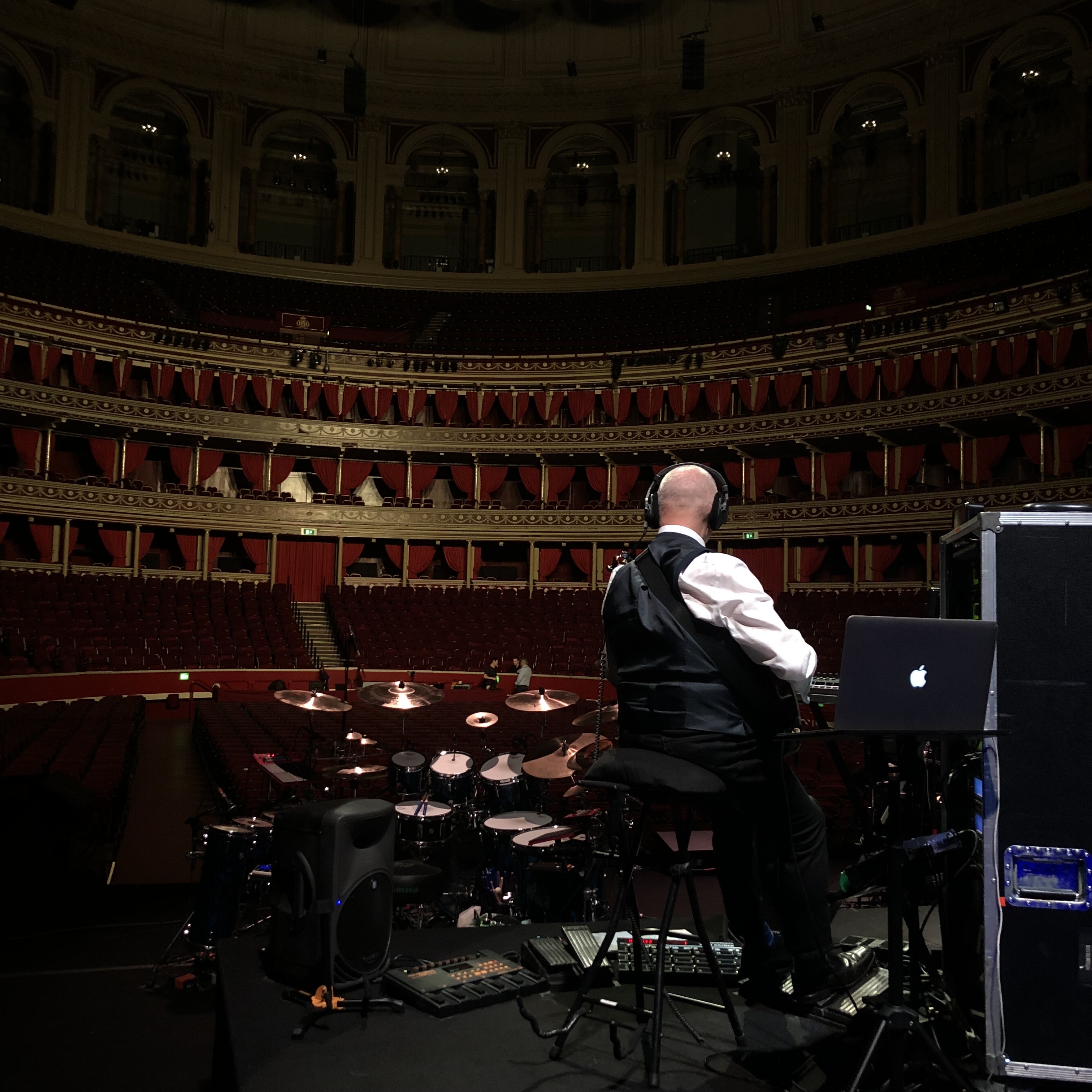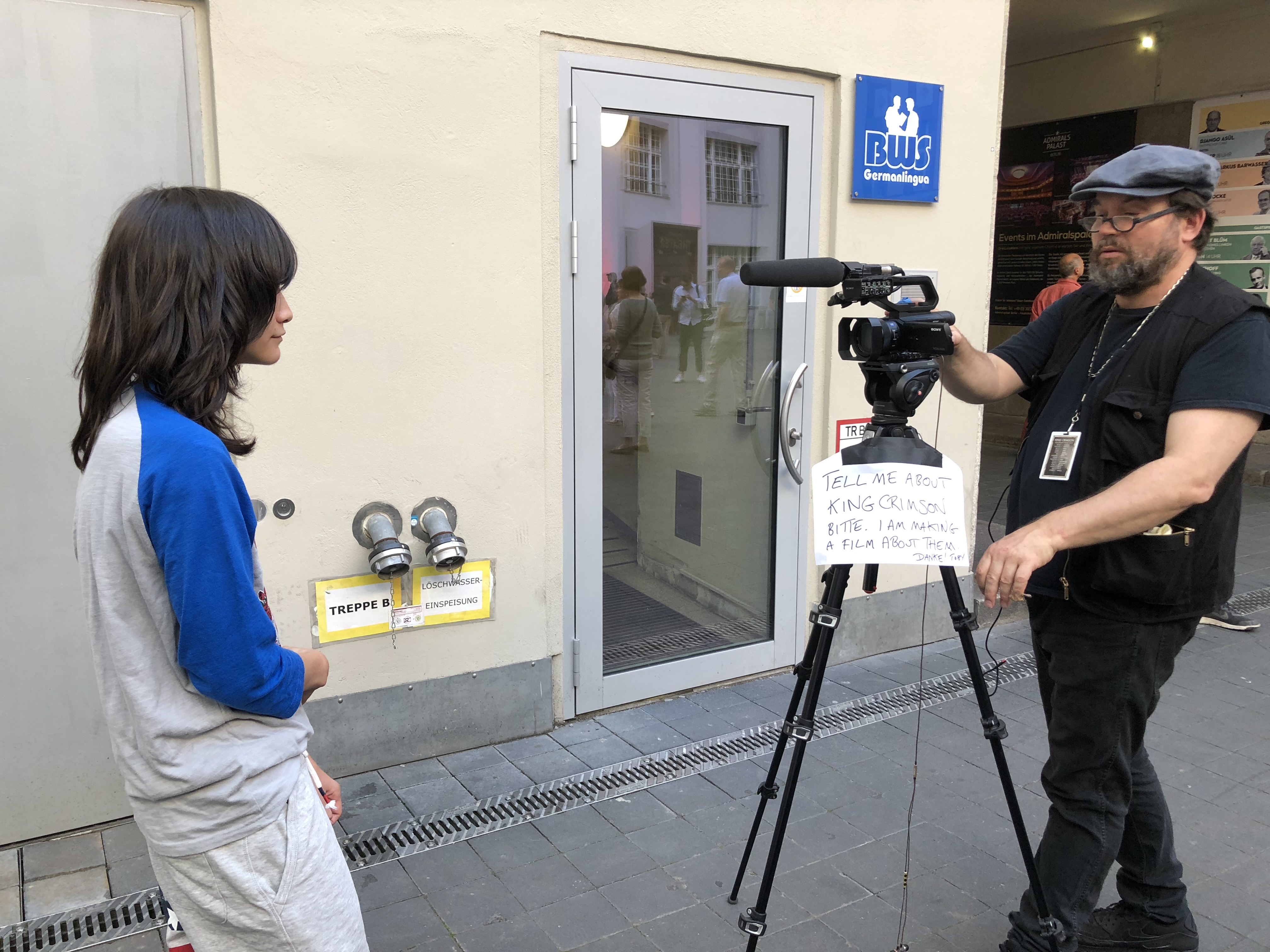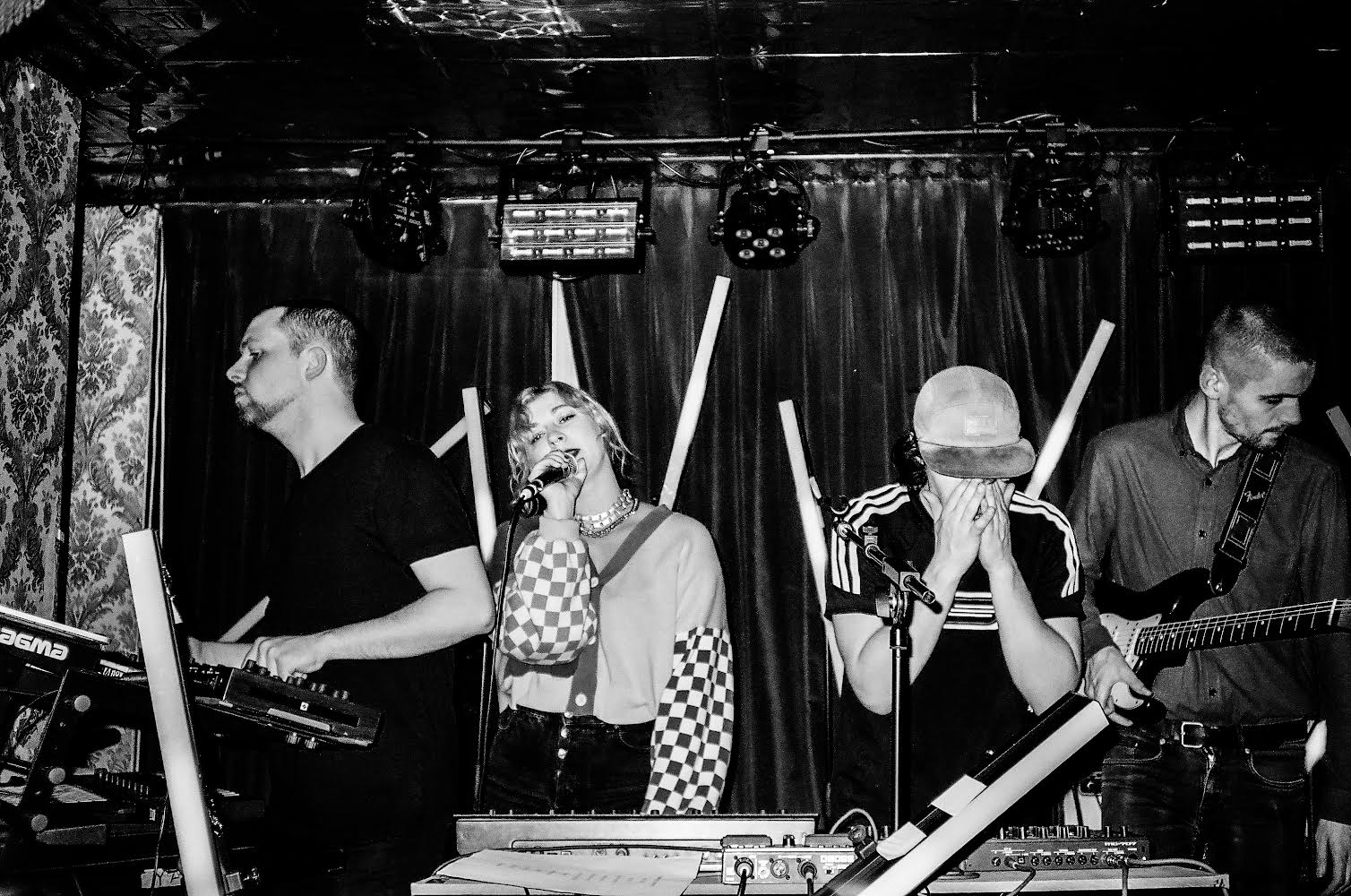Few modern music documentaries approach the kind of magic that is layered throughout Toby Amies’ In The Court of the Crimson King. The British filmmaker and broadcaster’s study of Robert Fripp and his band, King Crimson, is a fascinating exploration of the dynamics – both personal and creative – that have long made Fripp’s musical vehicle a thing of near mythos.
Ahead of a screening and Q+A with Amies at Belfast’s Queens Film Theatre on Sunday 16th April, Brian Coney chats to the director about the many challenges, and myriad rewards, of tackling such an inscrutable subject and towering musical legacy.
Considering their legendary elusiveness, I can think of few things more Everestian than trying to capture the essence of King Crimson. I think you’ve managed something even more interesting with In The Court of the Crimson King (ITCOTCK). You’ve thrived in various projects throughout your career to date but surely this one felt like a significant undertaking from beginning to end?
IT WAS A TOTAL FUCKING BASTARD TO MAKE. But the film also explores the nature and level of sacrifice necessary to make worthwhile art, so in a way it’s appropriate to suffer too in describing the suffering of others. I leave it up to the audience to decide whether it was worth it.
A friend of mine who is an excellent painter, Dolly Thompsett once advised me to allow the subjects of my films help and inspire me to define the shape of them and I have followed that advice ever since.
Like countless others, I’ve been inspired to create while listening to King Crimson. The odd written piece or maybe a guitar phrase, but nothing even close to your film. You’ve talked about you weren’t a particularly big fan of their music before taking on the film. Did that evolve much throughout the process?
I came to have an enormous appreciation and respect for what Crimson do and bring into being. I’m not sure there are many songs I would listen to for pleasure per se, as I tend to like primal rock and roll and especially soul so the absence of the blues/groove in most KC music is a little off-putting for me, but the music and its multiple depths is, as you say, very inspiring. And live they were absolutely extraordinary and wonderful. My lovely Mum came to one of the Royal Albert Hall shows and was very moved by it. As I’ve said before and it’s still the best analogy for me, like having a deep tissue massage by a masseur who knows your body better than you do.
Robert Fripp is widely regarded as stoic and the human embodiment of unknowable. ITCOTCK more than succeeds by making him feel both reachable – strangely knowable at times – while honoring much of that mystique. How conscious were you of striking that balance or did it happen organically?
I thought it would be a more interesting film if I gave the audience what was necessary to draw their own conclusions about Robert and his methodology and some elements of KC scripture too. It’s not for me to tell, I would much rather show.
One of my favorite things about the film is how faithfully it captures how the band’s past – and past members – all play their role in the band’s enduring legacy. This could easily have been a portrait of just Robert but you trace the band as a full, unfurling continuum. How vital was it to you to ensure all the voices – from Jakszyk to Bruford and Belew – were heard?
Thank you. There has been some kvetching online about the absence of a straight KC bio but what I wanted to do was link the past and present. The experiences of past members are sometimes analogous to those of present members and other times not. Like Trigger’s Broom, KC remains KC whilst undergoing change. Documentaries are much more about what was left out than what’s left in and whilst there are HUGE omissions in terms of the personnel included – no Greg Lake, no Boz Burrell, no Keith Tippet, no David Cross, no Gordon Haskell, no Peter Giles, no John Wetton. I wanted to show both the continuum and the changes as best I could. The film explores different approaches to time whilst still doing its best to feel present. Oftentimes several people would say roughly the same thing about the experience of being in KC and I ended up using the most pertinent and immediate version of a shared understanding. So it’s not so much all the voices but more to keep the most important ideas to the fore.
You’ve spoken about how Robert was the most difficult interview subject you’ve ever had, which is remarkable considering some of the artists you’ve interviewed in the past. Like chatting with a Beefheart or Mark E. Smith, there’s a sense that it’s largely a battle of the wills with him – a game where in order to unravel some detail or revelation you have to persist without fear. Many scenes in the film feel like a major payoff but I take it getting there was exhausting?
I canˋt remember which James Bond book it was but in one of them Fleming describes a martial arts technique where the fighters train the muscles involved in the dropping and retracting of one’s testicles and the masters of the technique would be able to retract the twins at will, allowing themselves to be REPEATEDLY KICKED IN THE BALLS without too much pain.
I’ve always suspected Robert to be terrifyingly – almost antagonistically – cerebral as a general rule, and the film clearly confirms this. And yet his scythe-sharp wit and softer side stood out for me. Without saying too much, there is one wonderfully room-silencing scene in the film that captures the latter, far beyond all his obsession and quietly domineering rigor. What was your own personal experience of being privy to that side of him?
As we share a home town I have known Robert socially for some time and one of my early frustrations when filming him was that I was not getting access to as full a spectrum of his personality as I felt was necessary to allow the audience to have some understanding of him. Over time and as I gained more consent from himI gathered enough material that it became possible. With regard to that one event, what we refer to as the “the megapause” I was both concerned and hypnotised by it, in the film I think it operates very well to give the audience and opportunity to let the drama of the preceding events percolate and settle and I think that is the point where the meaning of the film become clear. Personally I would NOT like to have a film made about me, so I am appreciative that Robert was as open as he was (though it was often a real struggle) and I want to make clear that there was no creative interference from neither Robert nor David Singleton the band’s manager. I don’t think there is any other band in the world that would have done that. Only one member insisted on a couple of minor cuts that didn’t affect the story and I think it’s a fun game for King Crimson fans to work out who that was.
Music films that don’t account for the artist’s actual music – particularly live – often feel squandered. Flipping between concert film, fly-on-the-wall and one-on-one interviews, ITCOTCK doesn’t have that problem. How much consideration and planning had to go into the filming and sound recording of King Crimson live, and in such varied spaces?
Everything I filmed of them playing live on tour was “stolen” and in some instances I got into trouble for it! Some people might call Robert’s attitude to filming the live shows “precious” but personally I admire it and was careful to gather the material I thought necessary as subtly and surreptitiously as possible without getting in the way and changing the nature of the thing I wanted to document. However Robert and the band agreed to do a show JUST for the cameras which is the ongoing live performance that continues throughout the film that we keep cutting back to, where you see the music-making under a microscope of sorts. Other than the planning necessary for that performance everything else I filmed was largely reactive/made up on the spot. I think it’s fair to say that I mostly lack discipline but I am an enthusiastic improviser.
There’s a deep sense of unscripted theatre to even the most passing scenes in the film. Almost every shot feels on the cusp of documenting some subtle chaos or conflict as a result of dynamics between Robert and others. And then there’s the magic of the chance scene following one of the band’s shows in Poland. Which filmmakers’ work informed your approach to this?
I want the audience to experience as much as possible the sense of being in the moment that I was in with my camera. That’s the difference to me between documentary cinema and documentary television. I have two major documentary influences: Ross McElwee who made a very subjective, joyously human and idiosyncratic film called Sherman’s March which is meant to be about one thing and ends up about being something very personal and different, and then I play a lot of first person shooter video games so I owe a lot to the designers of open world FPS’s like Skyrim and Fallout. Every time I plan/try to control stuff it normally fucks up and I end up missing some moment of kismet, so now I try to trust in my instinct and reactions.
I adore how prominently you feature the band’s fan base. They’re an extraordinary bunch that deserve a light to be shone on their deep love of the music. What was your main takeaways interacting with them for the film?
Have you seen Our Hobby is Depeche Mode? It’s a film by my friends Nick Abrahams and Jeremy Deller, it’s a doc. about Depeche Mode but ONLY through the eyes of their fans. It’s another influence on the film, but I’ve always been focused on the audience when making work whether as a presenter, filmmaker… or where it really comes from, as a DJ where you get immediate feedback. The people who love a band are often far more eloquent in communicating why and how something matters than the artists who make the work who already have their hands full.
You’ve recently said that you think King Crimson (particularly Discipline-era) should be considered one of the best post-punk bands of all time. I’m very inclined to agree. Can you give some thoughts on how you feel this in relation to how they’re viewed almost exclusively as a prog band?
Nice. Maybe it has to do with the music press (especially in the UK) being fairly unfriendly to bands they had already categorised as one thing becoming another thing? And then by the time they could have caught up KC had become something else and then a series of ProjeKCts!
For all its comprehension, the film doesn’t give the whole thing – the whys and whats – away. There’s a couple of pivotal scenes where Robert is reflecting on his past that offers more questions than answers. It would seem that, like two magnets repelling, the closer you get to even remotely defining King Crimson, the further away it gets. That feels majorly significant to me. Does it to you?
The first rule of showbusiness is “always leave them wanting more”. In this case I want people to go and explore King Crimson themselves after seeing the film, it’s still, I hope, a very satisfying cinematic experience but with plenty more to discover and enjoy after seeing the film. As I’ve said before, if something is constantly changing then how do you define it other than to point that out? I like films (and people) where they are neither one thing nor the other but rather a conversation or dialectic between several different approaches to, and perspectives on, life and work. I’m a Midlander and to grow up in the Midlands is to exist in the centre of a stupid binary framing of culture and geography so an equivocal perspective is part of my DNA. I want the people who see the film to walk out discussing how Robert can be, as Bill Bruford puts it, equal parts Josef Stalin, the Marquis De Sade AND Mahatma Ghandi and often as many other things as well. Sometimes at the same time. One of my mottoes is “stop learning, start dying” and once you know what something is from every angle it gets rather dull doesn’t it?
Toby Amies will do a Q+A following a screening of In The Court of the Crimson King at Belfast’s Queen’s Film Theatre on 16th April. Go here to buy tickets







